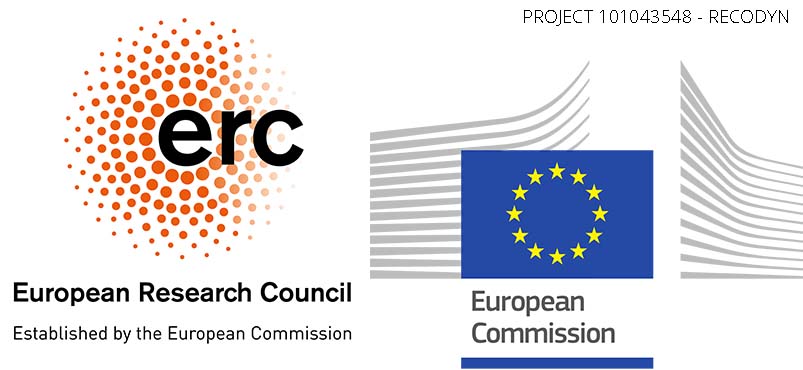Recruitment for RECODYN at the Basque Center for Climate Change


Closed
As part of the Basque Centre for Climate Change (BC3), the Terrestrial Ecosystem Research Line, more specifically the group of ‘Biodiversity, Ecosystems and Global Change’ (http://danielmontoyalab.com/) which focuses its research on the effects of global change on biodiversity, community structure, ecosystem functioning and ecological stability, is seeking (more specific details of each position are provided below):
- A Postdoc in Theoretical Ecology. The applicant will work on linking temperature-dependent community dynamics and metacommunity theory (Duration of the contract – 3 years, extensible).
- Postdocs in Experimental Terrestrial Ecology (I). The applicants will focus on biodiversity, community structure and dynamics and ecosystem functioning in mesocosm experiments (Duration of both contracts – 3 years, both extensible).
- Postdocs in Experimental Terrestrial Ecology (II). The applicants will focus on biodiversity, community structure and dynamics and ecosystem functioning in mesocosm experiments (Duration of both contracts – 3 years, both extensible).
- A PhD student in Experimental Terrestrial Ecology. The applicant will work on the effects of warming and fragmentation on ecosystem functioning on terrestrial mesocosm experiments (Duration of the contract – 4 years).
- A Technician in Experimental Terrestrial Ecology. The applicant will work on the sampling and maintenance of the mesocosm experiment (Duration of the contract – 4 years).
- A part-time Administrative Project Officer The applicant will work in the administrative aspects of the project, including, among others, contracting, travel, accommodation, and purchases (Duration of the contract – 5 years).
Most of these positions are part of the ERC Consolidator Grant RECODYN “Ecosystem recovery dynamics and their response to climate change and habitat fragmentation” lead by Daniel Montoya. The project will adopt an integrative approach that combines the development of new theory in ecosystem recovery dynamics in close dialogue with a unique long-term terrestrial mesocosm experiment located in France. For more information on the project, click here.
We seek highly motivated and creative individuals with a good command of the English language and with expertise in the areas mentioned. Researchers will join a vibrant interdisciplinary research center of empirical and theoretical ecologists, computer scientists, economists and social scientists.
To apply, follow the application instructions of each job offer.
Review of applications will start immediately until the positions are filled.
About the project: ERC CoG RECODYN – Ecosystem recovery dynamics and their response to climate change and habitat fragmentation
PI: Daniel Montoya. Basque Centre for Climate Change (BC3 – Spain)
Global change degrades ecosystems worldwide. To mitigate its effects is the environmental challenge of our age, and restoration has emerged as the main strategy to stem the biodiversity crisis and repair damaged ecosystems. Despite substantial progress on the number of restoration studies and datasets, there is a fundamental gap in our understanding and prediction of the patterns and mechanisms underlying ecological restoration and how they are altered by global change.
The goal of RECODYN is to determine the recovery rates and trajectories of biodiversity, community structure and ecosystem functioning in complex multitrophic communities, and how climate change and habitat fragmentation – two of the largest threats to biodiversity and ecosystems in terrestrial systems – influence those dynamics. To achieve this, the project will use an integrative approach that combines the development of new theory in ecosystem recovery dynamics in close dialogue with a unique long-term terrestrial mesocosm experiment located in France. RECODYN will be organized around three Work Packages (WPs) in order to maximize feedbacks between new theoretical developments and experimental work.
WP1. Spatiotemporal dynamics in naturally-assembled vs recovering ecosystems. What are the rates and trajectories (i.e. dynamics) of different facets of biodiversity, community structure, spatial and temporal stability, and key ecosystem functions along restoration? What are the similarities and differences between natural assembly and recovery dynamics?
WP2. Global change effects on ecosystem recovery dynamics. What are the interactive effects of changing temperatures and increasing isolation and dispersal limitation in the recovery of the previously mentioned community and ecosystem properties?
WP3. Management recommendations for ecosystem recovery under global change. What theoretically and empirically grounded practices should be adopted to restore ecosystems in the global change era?
RECODYN proposes an ambitious integrative and innovative research program that will provide a much-needed new perspective on ecological restoration in an era of global change. It will greatly contribute to bridging the gap between theoretical and empirical ecology – by developing innovative research where new theory and experimental tests are developed in conjunction –, to bring restoration and fundamental ecology together, and to move restoration from an idiosyncratic discipline to a more predictive science – by determining the general patterns and mechanisms in the recovery dynamics of biodiversity, community structure, stability and ecosystem functioning. This knowledge is vital to decide what, how and when we can intervene to accelerate ecosystem restoration. RECODYN will foster links with environmental policy by providing new restoration measures that derive from our theoretical and empirical findings.

